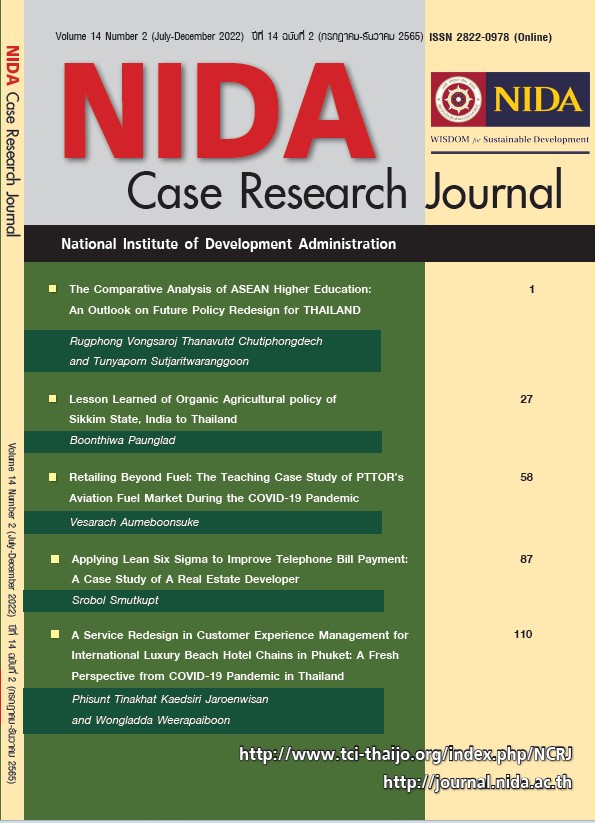The Comparative Analysis of ASEAN Higher Education: An Outlook on Future Policy Redesign for THAILAND
DOI:
https://doi.org/10.14456/ncrj.2022.1Keywords:
Higher education policy, Policy redesign, ASEAN, Foresight, ThailandAbstract
This research article aims at suggesting higher education policy redesign for Thailand. Through a documentary research approach, lessons learned were drawn from Singapore and Malaysia countries providing excellent higher education development regarding World Economic Forum. The comparative analysis revealed that Singapore and Malaysia those adopted as a important tool for enhancing national competitiveness through concrete higher education development plan and lifelong learning platforms. They have high spending and investing proportion in higher education and research sector focus on developing learners’ skills by networking with stakeholders in the ecosystem. Lastly, meticulous policy executions were steadily found in Singapore and Malaysia.
References
Andreescu, L., Gheorghiu, R., Zulean, M., & Curaj, A. (2012). Systemic foresight for Romanian higher education. In European higher education at the crossroads (pp. 995-1017). Springer.
Bowen, Glenn. (2009). Document analysis as a qualitative research method. Qualitative Research Journal, 9(2), 27-40.
Dobbins, M., Knill, C., & Vögtle, E. M. (2011). An analytical framework for the cross-country comparison of higher education governance. Higher education, 62(5), 665-683.
El-Azar, Diana & Nelson, Ben. (2020). How will higher education be different in 2030? https://www.britishcouncil.org/voices-magazine/future-higher-education
Harmsen, R., & Braband, G. (2021). The OECD and higher education policy: Agenda-setting, organizational dynamics and the construction of convening authority. Higher Education Policy, 34(3), 582-602.
Karran, T., & Mallinson, L. (2019). Academic freedom and world-class universities: A virtuous circle? Higher Education Policy, 32(3), 397-417.
KPMG. (2020). The future of higher education in a disruptive world. KPMG International.
McKinsey & Company. (2021). How to transform higher-education institutions for the long term.https://www.mckinsey.com/industries/education
Ministry of Education. (2019). Singapore’s education system: An overview.https://www.moe.gov.sg/
Mintz, Steven. (2020). K-12 trends and the future of higher education. https://www.insidehighered.com/blogs
Nasruddin, E., Bustami, R., & Inayatullah, S. (2012). Transformative foresight: Universiti Sains Malaysia leads the way. Futures, 44(1), 36-45.
Piirainen, K. A., Andersen, A. D., & Andersen, P. D. (2016). Foresight and the third mission of universities: The case for innovation system foresight. Foresight, 18(1), 24-40.
Ratanawaraha, Apiwat. (2020). Future studies (2nd ed.). Thailand Science Research and Innovation.
Sanders, J. S. (2020). Comprehensive internationalization in the pursuit of ‘World-Class’ status: A cross-case analysis of Singapore’s two flagship universities. Higher education policy, 33(4), 753-775.
SEAMEO. (2017). Guidebook to education systems and reforms in Southeast Asia and China. ASEAN-China Centre.
Shamsir, M. S., Krauss, S. E., Ismail, I. A., Ab Jalil, H., Johar, M. A., & Rahman, I. A. (2021). Development of a Haddon matrix framework for higher education pandemic preparedness: Scoping review and experiences of Malaysian universities during the COVID-19 Pandemic. Higher Education Policy, 1-40.
Stolze, A., & Sailer, K. (2021). An international foresight reflection on entrepreneurial pathways for higher education institutions. Industry and Higher Education, 35(6), 700-712.
UNESSCO. (2014). Education systems in ASEAN+6 countries: A comparative analysis of selected educational issues. UNESCO Bangkok Office.
UNESCO. (2021). Report on the futures of higher education envisions collective and holistic responses to global challenges. https://www.iesalc.unesco.org/en
Vongsaroj, Rugphong. (2020). Higher-education policy redesign in ASEAN+3 countries. Thailand Science Research and Innovation.
Voros, Joseph. (2003). A generic foresight process framework. Foresight, 5(3), 10–21.
World Bank (2021). 5th pillar higher education and training, value. https://tcdata360.worldbank.org/indicators
Wu, S. J., Chang, D. F., & Hu, H. (2019). Detecting the issue of higher education over-expanded under declining enrollment times. Higher Education Policy, 1-24.
Yin, K. Robert. (2011). Qualitative research from start to finish. The Guilford Press
Ziguras, C. (2016). Globalization and the transformation of Asian higher education. In C. S. Collins, M. N. N. Lee, J. N. Hawkins, & D. E. Neubauer (Eds.), The Palgrave handbook of Asia Pacific higher education (pp. 73-88). Palgrave Macmillan US.
Downloads
Published
How to Cite
Issue
Section
License
Copyright (c) 2023 NIDA Case Research Journal

This work is licensed under a Creative Commons Attribution-NonCommercial-NoDerivatives 4.0 International License.





